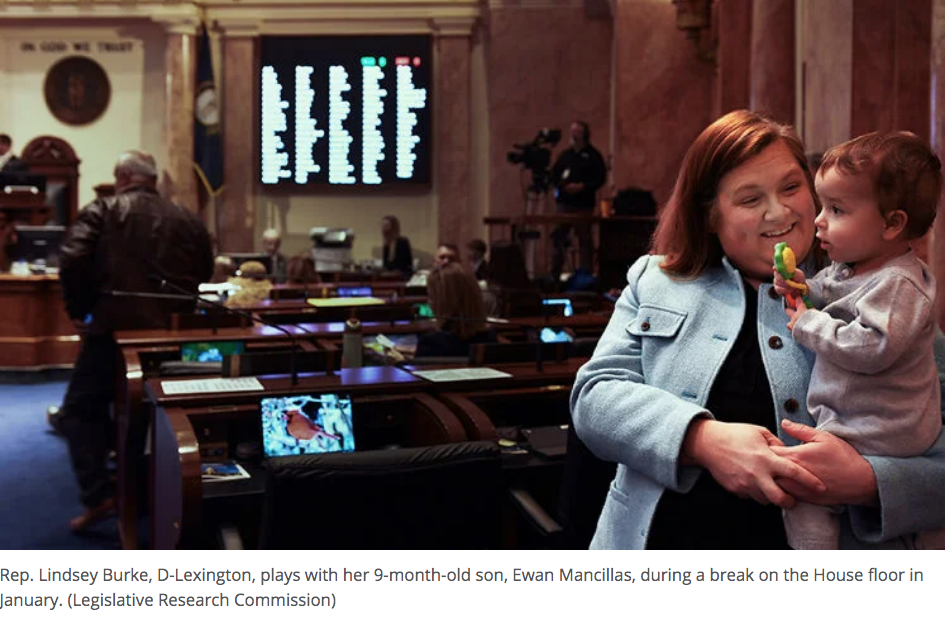Lawmaker presents abortion ban reversal, shield law and postpartum depression bills
Published 4:25 pm Thursday, February 8, 2024
|
Getting your Trinity Audio player ready...
|
By Sarah Michels, Bluegrass Live
Lexington Democrat Lindsey Burke on Wednesday presented three bills dealing with reproductive and maternal health care.
After sharing her own complex journey to motherhood, Burke went through the details of each. One of Rep. Burke’s bills is called “The North Star.” It would reverse all of Kentucky’s abortion bans, returning the state to 2015’s status quo.
The proposed bill states that “every individual has a fundamental right to choose or refuse to bear a child or obtain an abortion prior to the viability of the fetus, or to protect the life or health of the pregnant person.”
Anyone who obtains or performs an abortion in Kentucky under this bill would be exempt from criminal or civil liability. In 2015, Democrats held a majority in the Kentucky legislature. But in 2019, a new Republican majority passed a law that reduced the point at which someone could obtain a legal abortion from 22 weeks after conception to six weeks.
Tamara Wielder, Planned Parenthood Kentucky state director, said that there have been as many as 3,000 rape-related pregnancies in Kentucky since Roe V. Wade was overturned by the U.S. Supreme Court.
“Surviving the brutality of rape is hard enough,” she said. “Being forced to remain pregnant after is profoundly wicked. Kentuckians are living with the consequences of these bans every day.”
Shield law
Burke’s so-called shield law would protect those who cross state lines to receive abortions or abortion-related services from civil or criminal liability. It would prevent the state from obtaining the medical records of these individuals in order to prosecute them.
Anyone who seeks info about or expresses interest in obtaining an abortion, provides financial assistance or transportation to someone traveling to another state to get an abortion or shares information on how to access abortion services could not be prosecuted under this bill.
Health care providers and businesses that assist in any of these ways would not lose their licenses. If the state violates this, the bill would give women the right to sue in civil court.
Katima Smith-Willis, atAdvocacy project manager, said that supporting abortion access is not a “statement against motherhood.”
“It’s a statement in support of the complex and often challenging journey that is motherhood. It’s about trusting mothers to make the decisions that are right for them, their families, their futures and everything above.”
Postpartum depression
Burke’s third bill would add some language to the Health Access Nurturing Development Services Program, a voluntary statewide home visitation program for at-risk parents before and after giving birth.
The program provides new parents with wraparound services, including education on safe and healthy delivery, optimal child development and home safety.
This bill would add another piece to the program: education on maternal and postpartum depression. New mothers would be taught how to recognize and treat these conditions.
“I think this is a very simple way that we can improve the lives of parents and children in Kentucky,” Burke said. “This, to me, should be a very nonpartisan issue.”
Burke’s story
Burke was motivated to file these bills from her personal experience trying to become a mother. At 17, she said that she was raped, but it did not lead to a pregnancy.
About a decade later, she was diagnosed with polycystic ovary syndrome (PCOS), which causes hormone issues during the reproductive years that can lead to infertility.
Burke and her husband tried IUI and IVF, alternative methods to pregnancy. Their first successful embryo transfer ended in a miscarriage, and Burke had a D&C, an early abortion, since her body thought she was still pregnant.
On Burke’s second try, two embryos, which could have led to twins, were implanated. However, the first twin had fatal fetal abnormalities, with his organs growing outside of his body.
Burke’s doctors told her that he would likely not survive the pregnancy, but waiting until he passed away on his own would put her second baby at risk. Burke decided to “selectively terminate” the first twin to protect the second, a service she could not access in Kentucky due to a lack of reproductive health care.
While Burke wanted to be a mother, complications made these abortions the best choice for her, she said. She said she told her story to highlight that pregnancy is not simple, and there are “many reasons that people need access to reproductive care.”





